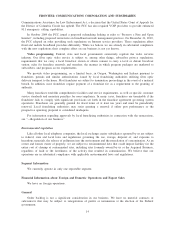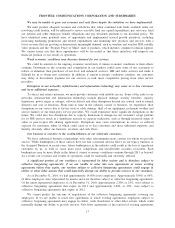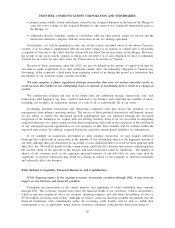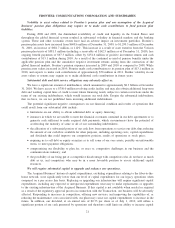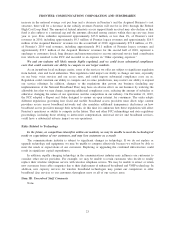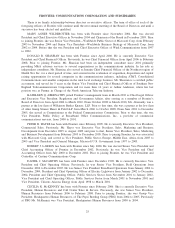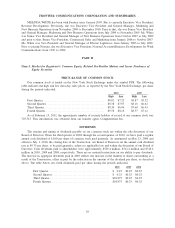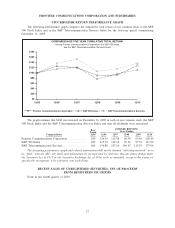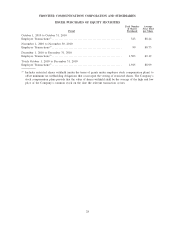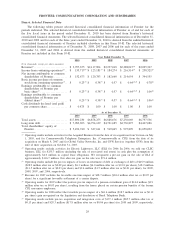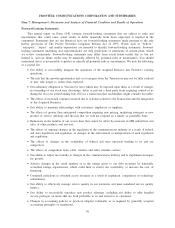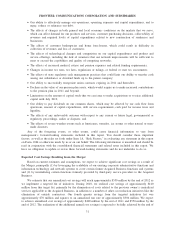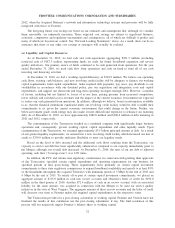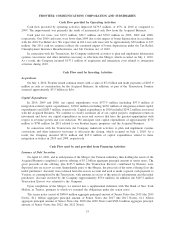Frontier Communications 2010 Annual Report Download - page 24
Download and view the complete annual report
Please find page 24 of the 2010 Frontier Communications annual report below. You can navigate through the pages in the report by either clicking on the pages listed below, or by using the keyword search tool below to find specific information within the annual report.increase in the national average cost per loop and a decrease in Frontier’s and the Acquired Business’s cost
structure, there will be a decrease in the subsidy revenues Frontier will receive in 2011 through the Federal
High Cost Loop Fund. The amount of federal interstate access support funds received may also decline as that
fund is also subject to a national cap and the amounts allocated among carriers within that cap can vary from
year to year. State subsidies represented approximately $25.8 million, or less than 1%, of Frontier’s total
revenues in 2010, including approximately $9.3 million of Frontier legacy revenues and approximately $16.5
million of the Acquired Business’ revenues for the second half of 2010. Approximately $73.8 million, or 2%,
of Frontier’s 2010 total revenues, including approximately $41.1 million of Frontier legacy revenues and
approximately $32.7 million of the Acquired Business’ revenues for the second half of 2010, represent a
surcharge to customers (local, long distance and interconnection) to recover universal service fund contribution
fees which are remitted to the FCC and recorded as an expense in “Other operating expenses.”
We and our industry will likely remain highly regulated, and we could incur substantial compliance
costs that could constrain our ability to compete in our target markets.
As an incumbent local exchange carrier, some of the services we offer are subject to significant regulation
from federal, state and local authorities. This regulation could impact our ability to change our rates, especially
on our basic voice services and our access rates, and could impose substantial compliance costs on us.
Regulation could constrain our ability to compete and, in some jurisdictions, may restrict our ability to expand
our service offerings. In addition, changes to the regulations that govern our business (including any
implementation of the National Broadband Plan) may have an adverse effect on our business by reducing the
allowable fees that we may charge, imposing additional compliance costs, reducing the amount of subsidies or
otherwise changing the nature of our operations and the competition in our industry. On December 21, 2010,
the FCC adopted a Report and Order designed to ensure an open internet for consumers. The order adopts
different regulations governing how fixed and mobile broadband access providers must allow edge content
providers access across broadband networks and also mandates additional transparency disclosures on how
broadband access providers manage their networks. At this time it is unknown how these regulations will affect
Frontier’s operations or ability to compete in the future. This and other FCC rulemakings and state regulatory
proceedings, including those relating to intercarrier compensation, universal service and broadband services,
could have a substantial adverse impact on our operations.
Risks Related to Technology
In the future, as competition intensifies within our markets, we may be unable to meet the technological
needs or expectations of our customers, and may lose customers as a result.
The communications industry is subject to significant changes in technology. If we do not replace or
upgrade technology and equipment, we may be unable to compete effectively because we will not be able to
meet the needs or expectations of our customers. Replacing or upgrading the combined infrastructure could
result in significant capital expenditures.
In addition, rapidly changing technology in the communications industry may influence our customers to
consider other service providers. For example, we may be unable to retain customers who decide to totally
replace their wireline telephone service with wireless telephone service. We may be unable to attract or retain
new customers from cable companies due to their deployment of enhanced broadband and VOIP technology. In
addition, new capacity services for wireless broadband technologies may permit our competitors to offer
broadband data services to our customers throughout most or all of our service areas.
Item 1B. Unresolved Staff Comments
None.
23
FRONTIER COMMUNICATIONS CORPORATION AND SUBSIDIARIES



